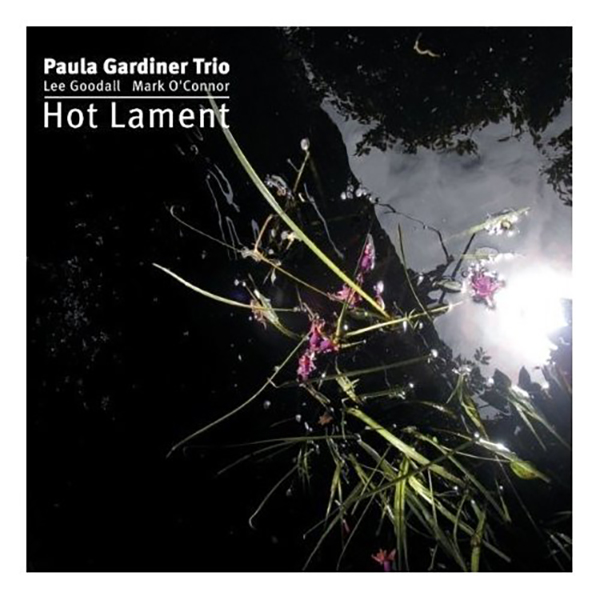
by Ian Mann
September 23, 2008
/ ALBUM
A musical journey that is well worth undertaking. "Hot Lament" deserves to bring Paula Gardiner to the attention of the national jazz audience
Double bassist Paula Gardiner has been an important presence on the Welsh jazz scene for a number of years. She is a director of Brecon Jazz as well as being a regular performer at the festival and is also a respected jazz educator in her role as head of the Jazz course at the Royal Welsh College of Music & Drama. In addition to all this she is also the Honorary President of the Swansea based Women In Jazz organisation.
With such a busy schedule it is a wonder that Gardiner actually finds time to play and compose. Nevertheless “Hot Lament” is her third album as a leader albeit the first album under her own name for some time. The attractively melodic “Tales Of Inclination” featuring guitarist John Parricelli was released in 1995 followed in 1999 by “Six”, another excellent offering featuring leading players from the vibrant South Wales jazz scene.
More recently she has found herself playing to national audiences as a member of the Dave Stapleton Quintet, a band featuring a number of her ex-students. She makes a substantial contribution to both DSQ albums “When Life was in Black And White” and “The House Always Wins”.
“Hot Lament” is Gardiner’s most ambitious recording to date and finds her working in a pared down trio format. Her partners in this project are two other stalwarts of the South Wales scene, long time collaborators Lee Goodall (saxes & flute) and Mark O’Connor (drums). Both appeared on “Six” as members of a sextet. Goodall is in fact a respected multi instrumentalist also proficient on guitar and drums. He also owns Oakfield studios in Newport where “Hot Lament” was recorded.
“Hot Lament” consists of fourteen pieces of music varying from brief vignettes to more lengthy offerings. There is a good balance between the written and improvised content and the album covers a wide range of moods and styles. Gardiner was an accomplished classical guitarist before taking up the bass and she appears on this instrument here as well as making occasional contributions on flute. With this in mind and with Goodall appearing on a wide range of saxes from sopranino to tenor there is a remarkably wide sonic palette for a trio.
The album commences with the somrbe, moody title track full of brooding playing from Goodall shadowed by Gardiner’s flamenco style bass and O’Connor’s subtle but dramatic drums and cymbals.
“In The Garden” has an altogether lighter, folkier feel with Gardiner switching to acoustic guitar to accompany Goodall’s keening saxophone. O’Connor keeps a low profile providing subtle rhythmic colourings on small shakers.
“Interblue (1)” and ” Passage 1 (Unspoken)” are brief group improvisations, the first almost conventional jazz complete with walking bass, the second far more free and abstract.
Gardiner’s West African inspired composition “Riding On the Back Of the Salmon” features frothy flute from Goodall over Gardiner’s rich bass groove and O’Connor’s energetic drumming. His cymbal work is particularly impressive.
“Compassion” re-introduces the folk elements with Gardiner again featuring on acoustic guitar. Goodall’s pure tone ,O’Connor’s sparse but atmospheric percussion and the trio’s use of space are reminiscent of Jan Garbarek and the ECM aesthetic. It’s hauntingly beautiful music with a Celtic tinge.
“Passage 2 (Spoken)” is a brief passage of free playing with arco bass, ghostly bass flute and abrasive percussion. It is dark and unsettling.
“Embrace”, a short piece for acoustic guitar and understated percussion re-introduces a degree of serenity. It is followed by “Beneath Rioja Skies”, arguably the focal point of the album. Opening with Gardiner’s rich, dark unaccompanied bass the piece features one of Gardiner’s strongest melodies. Underpinned by Gardiner’s bass motif Goodall expands and builds on the melody and O’Connor’s drums are also a vital component, his cymbals almost taking the lead at times.
The second part of “Interblue” is little more than a soundbite but leads into “Comment” the lengthiest cut on the album. Inspired by the writings of Dorothy Parker the introduction features the twin flutes of Gardiner and Goodall. Drums and bass later kick in leaving Goodall to state the attractive African flavoured melody on flute. Again this is a memorable and beautiful tune given a sunny feel by the airiness of Goodall’s effervescent flute. Gardiner later picks up the melody on the bass for her solo before Goodall takes up the reigns again. O’Connor rolls and chatters around them, simultaneously providing rhythmic impetus and splashes of colour.
The lengthy"Fritillia” is a return to more atmospheric territory with Gardiner’s taut acoustic guitar and O’Connor’s spooky and dramatic percussion in largely improvised dialogue. It’s the kind of stuff that one can imagine being utilised on a film soundtrack.
“No Coincidence” is a thirteen bar tune sequenced at number thirteen on the album running order. It’s an Ornette Coleman inspired piece with Goodall’s declamatory, blues tinged saxophone dancing above the dense backing of Gardiner’s sturdy bass and O’Connor’s busy drums. Gardiner also solos powerfully and there are a series of breaks from O’Connor. Invigorating stuff.
The brief “Morning” featuring Gardiner on guitar and Ursula Harrison on recorder alongside O’Connor’s shimmering percussion brings the album to an atmospheric close.
Although not as immediately accessible as Gardiner’s previous albums “Hot Lament” is the kind of album that slowly grows on you. It has it’s sombre moments but there are sunny intervals too, particularly “Comment” and the trio cover an impressively wide range of moods and sounds. The brief improvised interludes that punctuate the lengthier compositions are fascinating in themselves and “Hot Lament” has a certain cinematic quality to it. Essentially it is a musical journey and one that is well worth undertaking.
With national distribution “Hot Lament” deserves to bring Paula Gardiner to the attention of a wider audience.
blog comments powered by Disqus